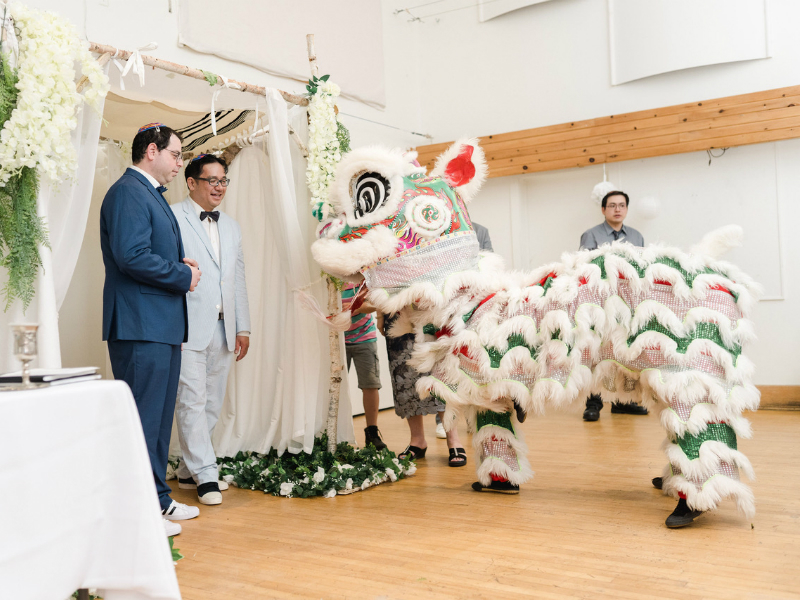I recently officiated a wedding that knocked my socks off. What made this wedding beautiful was the two men standing under the huppah: Jason, a bright, opinionated Jewish guy from Toronto, and Hon, a tall and articulate man of Chinese-Vietnamese ancestry. What made it extraordinary was how they talked about Judaism.
First, some history. I am a congregational rabbi. Two years ago, I changed my policy and started to officiate intermarriages. I hesitate to call them “interfaith weddings,” because my ceremonies do not include traditions of two different faiths. Rather, what I perform is essentially a Jewish wedding where one partner is not Jewish. The couples spend time studying with me in the months leading up to the wedding, discussing Jewish traditions and their meaning. The ceremony includes a huppah and a ketubbah, a glass is broken and Hebrew wedding vows are recited. There are a few liturgical changes, but in look, feel, form and content, I am performing Jewish weddings for couples who are creating Jewish households.
This was not a decision I took lightly. It came about because, after a decade in the rabbinate, during which I had politely declined to officiate for a number of interfaith couples (including my brother and his wife), I had come to the conclusion that I needed a new strategy. Sure, I was courteous and respectful in those conversations. I explained that I saw it as my rabbinical role only to perform weddings between two Jews. I clarified that this policy did not reflect any judgment on them or their choices, and that, in fact, we welcomed them to be part of our congregation.
But at the end of the day, no matter how polite the tone, the couples mostly experienced it as rejection. They didn’t take me up on my offer to counsel or teach them, and they certainly didn’t join the synagogue.
Somewhere along the line, it hit me: these couples were asking me to engage them Jewishly – they were actually sitting in my office requesting that I participate with them in a Jewish ceremony that would help frame their household and their life together. And I was saying no. That didn’t make sense to me anymore.
I believe a wedding (and the learning process that comes along with it) can be an opportunity to build relationships, teach about Judaism and lay the groundwork for further Jewish engagement throughout the couple’s life – which brings me back to Jason and Hon.
So there I am, standing under the huppah. The grooms are gazing at one another adoringly (and looking mighty sharp in their suits and bowties). They have slipped rings on one another’s fingers, declaring in Hebrew that “I am my beloved’s and my beloved is mine.” They have shared from a cup of kosher wine and signed a ketubbah. And now they have some original vows to share. But before reciting his vows to his beloved, Jason turns to his family and friends with a few words of explanation.
“I want to explain why today is happening, about the rabbi who is officiating our wedding, the synagogue that Hon and I are proud members of and the Jewish home that we are creating.”
Jason goes on to describe how alienated he has sometimes felt from Jewish tradition “because of some of its teachings.” I have heard this alienation in our conversations: the notion of being an outsider to his own people – both as a gay man and because he is in love with a non-Jew. He has lived for years with a sense that the religion he loved as a child hasn’t exactly had room for the adult version of him. He goes on to explain how his relationship with and marriage to a non-Jewish man have brought him closer to Judaism.
“All of this is driven by Hon’s love for me and his love of Judaism. To him, Judaism means family, community. Hon opened my eyes and ultimately my heart. That is why we proudly hang a mezuzah on our doorposts, why we proudly both read from the prayer book and invite the blessings of ha-Shem into our lives.”
At the end of the ceremony, the two grooms each break a glass and, in addition to the usual “mazel tov,” are greeted by a boisterous, colourful Vietnamese dancing dragon troupe. I stare wide-eyed at this ritual that is so foreign to me and realize that Jason and Hon are still wrapped in the tallit I placed across their shoulders. I think to myself: there is a good Jewish home to be made here, and I’m proud to have been involved in it.
I don’t claim to have all the answers. Like any rabbi (or any human being), I’m figuring this out as I go along. But I am coming to realize that every person who seeks out Jewish life represents an opportunity to foster engagement. That doesn’t mean that we will perform every wedding. Individual rabbis – myself included – will have policies and lines they won’t cross. But it’s important to recognize that when we say no, even for a good reason, it means passing on that opportunity; whereas when we find ways to say yes, it means seizing it.
In the 21st century, Jewish families come in all shapes and backgrounds, and we can never know what factor or experience will foster someone’s desire to engage. When we begin by meeting people where they are – by opening doors and inviting conversation – we can make Judaism accessible to a wider swath of our community. Then we are building for the future.
